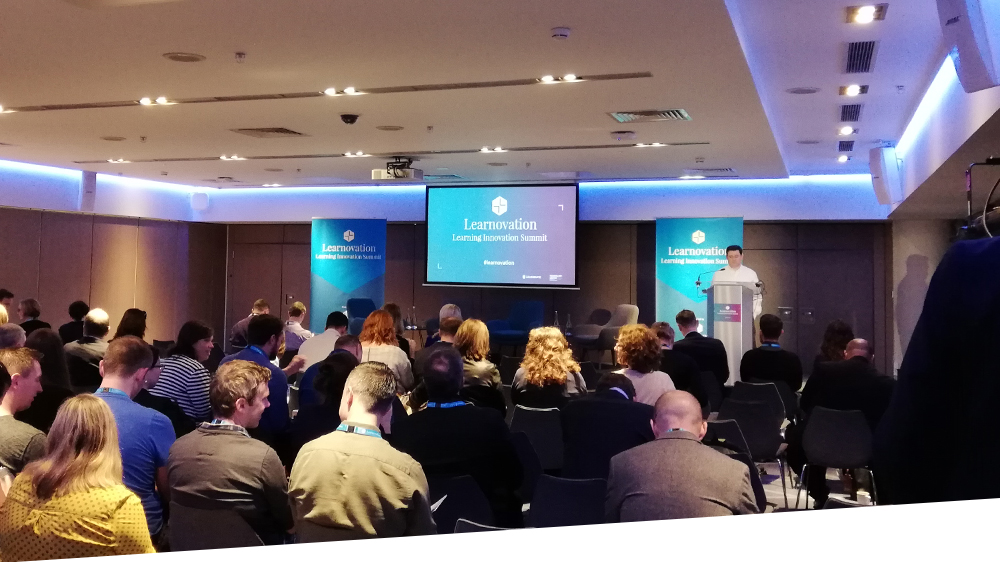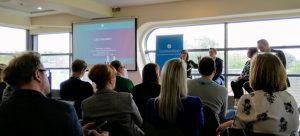
04 Oct Learnovation 2018
Fresh from visiting this year’s Learnovation Summit in Croke Park, the team at The Learning Rooms presents some key takeaway messages from a busy and insightful day.
Organised by Learnovate, the theme of the summit was the future worlds of education and work. Throughout the day, presenters from varied backgrounds spoke about the potential that technology brings to schools and the workplace, artificial intelligence, staff development, the gig economy, employee resilience, nudges in learning, game-based learning, innovation in learning and development, adaptive learning and curated learning, along with many other topics.
Find balance
For all the talk of the benefits that technology can bring, Owen White (Learnovate Centre Director) cautioned in his opening address that we should not become enamoured with tech, instead we should ask ourselves why we are building technological solutions and find the right balance between technology and the human context. He quoted Russell L. Ackoff:
“The more efficient you are at doing the wrong thing, the wronger you become. It is much better to do the right thing wronger than the wrong thing righter. If you do the right thing wrong and correct it, you get better.“
In his keynote address, Peter Cosgrove (Future of Work Expert) took us on a whistle-stop tour of the many ways in which our current augmented age is changing how we work today and how we will work in the future. In stating that work is not a place you go but rather a thing you do, Peter questioned whether Irish companies are ready to adapt to the changing needs of a modern workforce. He sees technology as both an opportunity and a threat and in the true spirit of the gig economy he urged us to be loyal to our skills.
Build habits
Celine Mullins (Adaptas) spoke about the psychology of learning and the importance of repetition in building habits. It takes 2-3 months for new habits to become long-term and Celine encouraged us to take personal responsibility for embracing repetition in the learning process in order to embed behavioural change. She quoted Alvin Toffler:
“The illiterate of the 21st century will not be those who cannot read and write, but those who cannot learn, unlearn, and relearn.“
Nudge
Peter Gillis (Learnovate) presented his research on nudges in learning. He described a nudge as any intervention that preserves freedom of choice but nonetheless influences people’s decisions. Nudges are the design of different ways in which choices can be presented for learners in a context. To work, a nudge by its nature must be to some extent covert in its intent. Peter spoke passionately about his own research in the area and touched on behavioural economics, liberal paternalism, choice architecture, big data and its decision guidance techniques and some of the other current research in the field.
Adapt
Later in the afternoon, John Kilroy (Harvest) and Thomas Kupetis (St. Charles Consulting Group) presented on their respective work in the field of adaptive learning.
John explained the ways in which personalisation can manifest itself in the learning experience. In the Elearning and blended learning arena, personalisation can involve chunking existing learning content into categories by role or grade in the workplace, or using branching. Personalisation in talent management provides opportunities to present staff with a learning pathway informed by their career pathway. Continuous learning might involve microlearning content (typically video-based) or recommended courses based on consumption data. Finally, learning in the flow of work affords potential for adaptive experiences, for example someone struggling to prepare a proposal document may be offered a chunk of just-in-time learning content on the topic via on-screen pop-up.
Thomas then dug a bit deeper into the adaptive learning experience and what it actually looks like for the learner. The behavioural data pulled from adaptive learning content allows employers to identify areas of confidently held misinformation and subsequently target specific departments or staff members with tailored learning on problematic topics. Thomas explained the process of curating content for learners as providing the right experience for the right audience at the right time and place.

The L&D Innovation Panel
Innovate
The day was brought to a close by a panel of industry professionals discussing the concept of innovation in learning and development. Panel Chair Sinead Heneghan (IITD) asked the panel about their own experiences of the purpose of innovation. Innovation frequently occurs as a reaction to a problem and at times of high pressure. Mark Melia (Enovation) expressed his efforts to be innovative on a more continuous basis, not just during these pinch-points. John Mulreid explained some of the ways that FBD is using innovative VR and AI tools to improve staff training and customer satisfaction. The panel discussed how sometimes a problem is not well enough defined before a technological solution is implemented. It can be helpful to spend time with a problem before discovering a solution and in turn identifying the technology to suit. For Tina Forrester (Blizzard Entertainment), a major enabler to innovation is management acknowledging that they are not the expert in everything. It is important to harness the cultural knowledge within an organisation.
After such a busy day of fascinating speakers and new ideas, this post offers just a taste of what we found most interesting. We will be expanding on some of the concepts and ideas in upcoming blog posts.
Subscribe to our Newsletter

